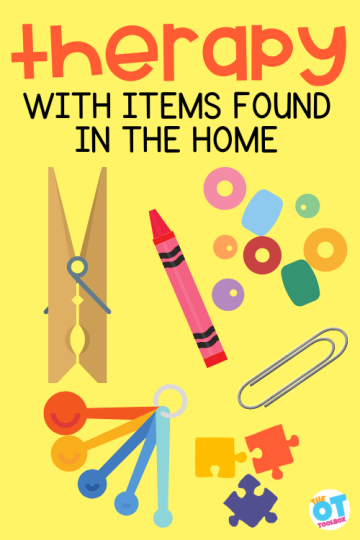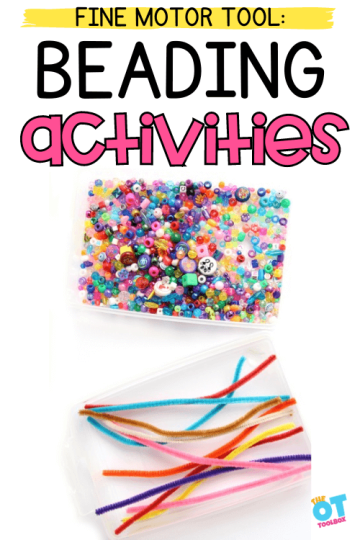Are you taking care of yourself with self care strategies as a busy therapy provider? Changes in routines, uncertainties, new requirements for therapy interventions…all of these transitions are reasons to add self care strategies in order to maintain occupational balance. In this post, I wanted to put together a toolbox for you. Here, you will find tips for self care for therapy providers. These are resources for self-reflection, mindfulness, self-care strategies, and easy ways for you to take care of yourself as a therapy provider.
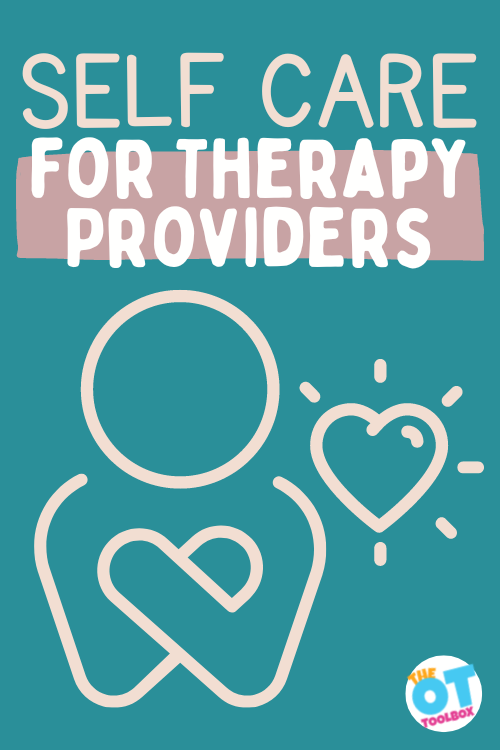
Take current events, the additional responsibilities of distance learning (and teaching your own kids), social distancing, and the stress of getting through the grocery store. Then add the task of planning and running teletherapy sessions. Add digital communication with kids at extreme needs to regular work challenges (Helloooo billing, documentation, productivity…or even unemployment.)
All of this together can build to create a tipping point of worries, stress, and anxiety for therapy providers.
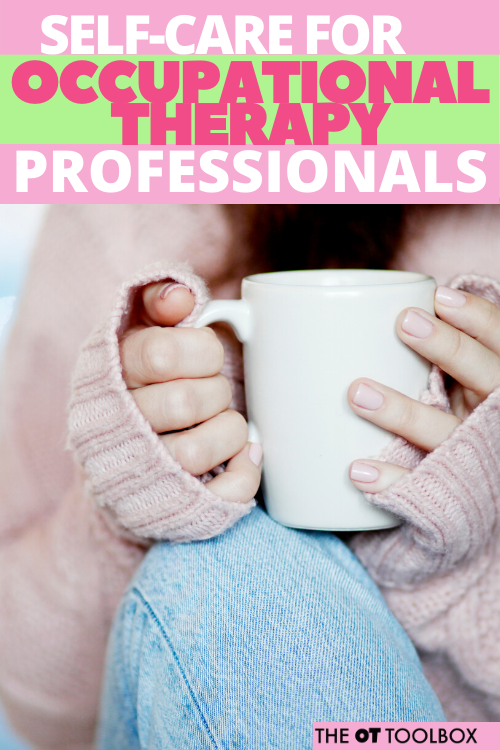
Self Care Strategies for Therapy Providers
Therapy professionals are no strangers to the need to have a self care plan in place. Occupational therapists, OTAs, speech therapists, and physical therapists, PTAs, are long-time sufferers of therapy burnout.
Take a look at the caseload requirements, productivity standards, and unpaid tasks that many therapists need to balance. But add in the new challenges with serving clients with increased productivity requirements, in many cases and self care for health professionals is very much-needed now more than ever.
Being cooped up at a computer means you may not be getting your regular exercise and dose of fresh air. All of that time spent indoors can lead to worries, depression, or a building up of anxiety in your chest. These self-care strategies are ways to heal those overwhelming feelings.

Self Care Balance
The thing is that as occupational therapy providers, we KNOW the need for balance. The occupational balance of work/play/rest is very much a service to ourselves and a fine line that must be honored. We recognize the need to set realistic expectations for ourselves.
We know the power that limitations in self care has when combined with work demands, income concerns, and health and safety of ourselves and those we love. But, HOW is that self care balance and a healthy lifestyle possible during uncertain times?
Pour yourself a cup of tea or grab yourself a hot mug of coffee. Curl up with a cozy blanket or sit in the outdoors as you read this, friends.
Here are self care strategies that will serve you well as therapists or health care professionals.
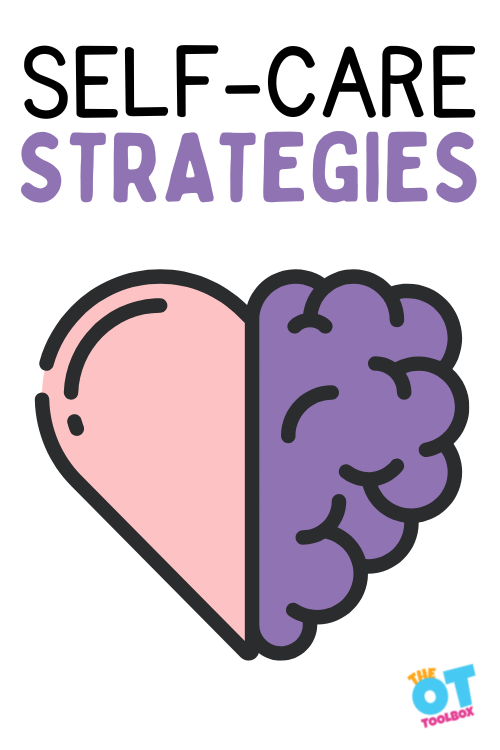
Self Care Strategies
Using self care methods as a healthcare provider offers an opportunity to promote your own well-being in order to maintain a healthy lifestyle so that you are capable of serving those in need. Sometimes it’s good to turn your well-tuned “OT lens” on yourself, right?
Try these strategies for emotional self care and physical self care needs. Some ideas may work for some, but not others. Others may find just the coping tool needed to find peace or a sense of occupational balance during uncertain times.
Mindfulness Strategies– Meditation or mindfulness practice on a regular basis offers a time for respite in daily schedules. Mindfulness is a great tool for boosting mental health. By intentionally being mindfully aware in situations, you can focus on the current situation by being present.
Sensory Diet– As therapists, creating sensory diets is second nature. But, when the feelings of stress and burnout occur, what if we turned out therapy hat onto ourselves by using those very sensory tools as coping strategies? Here is an explanation of what a sensory diet is to get you started. Think outside of the box when it comes to identifying needs.
You may not be experiencing the typical signs of sensory distress, but worries, sadness, or emotional fluctuations can be a change from the norm that are impacted by a few sensory tools. Here are tools for creating a sensory diet that works for you.
Turn off the News (or Facebook!)- We talk a lot about screen time for kids, but adult screen free time is important, too! Giving your brain a rest on what other’s think or see is a way to give your mental health priority.
When everyone’s got an opinion (and it’s not at all encouraging, hopeful, or helpful…) all of that information can man overload in your brain that builds the stress levels.
Give yourself permission to social distance from and social media.
Journaling– Using a journal to self-reflect is a means of taking time to think through thoughts and emotions. By writing out problems, one can reflect on possible solutions and problem solve ways to address concerns. Your journal is a place to be kind to yourself. Use it well!
This self-reflection journal for therapists is a good way to keep track of your thoughts, progress, and work during this unprecedented time in history.
Yoga/Exercise- Schedule time in your day for some exercise, whether that be a 10 minute walk, yoga stretches in the morning, or a full exercise routine. Take a walk after work or at the end of the day, or do a quick YouTube video to get the blood moving.
Physical exercise, especially aerobic exercise has been show to improve regulation, emotions, and mood. For the busy therapist, a treadmill workout that fits into everyday schedules is the way to go.
This is the time that I love to run along to music, podcasts, and even Netflix when running on the treadmill. Can you pair a HIIT treadmill workout with an OT podcast or fun movie?
Self-Reflect- Take a good look at this whole situation. When you step back for a moment, it’s pretty darn surreal, right? We are in the middle of a very fascinating yet scary experiment in social awareness, communication, emotions, health, and everything about modern life! We as therapy providers teach kids about self reflection.
We instruct clients of all ages about tools and strategies to self-reflect for awareness into specific occupations so they can thrive.
Take just a few minutes to create a self care assessment of how you are responding to current situations. How can you use that information to come up with a plan?
Can you take a minute for personal self-reflection, and come up with a few coping strategies that will work for your situation? Think about what you would say to a client in the same situation.
Sleep in- Saturdays used to be full of kids’ sports, running to the market, appointments, events, visiting, errands, and all sorts of tasks, right? Use the slower days to give yourself a dose of rest. Sleep in an hour. Or as late as the kids allow. If sleeping in is a no-go, try an afternoon nap when the kids nap or hit the hay an hour or two earlier.
Focus on Efficient Sleep- At the very least, aim for effective sleep. Turn off the screens right before bed. Use a fan or white noise. Add light reducing curtains. Open a window for a cooler sleeping environment. Layer on a heavy blanket or weighted blanket for added proprioceptive input. Reduce caffeine in your diet. Sleep is good and good sleep is better.
Drink Water- Be sure you are drinking enough water. Schedule an alarm on your phone if needed.
Go Outside- Just sitting outside or being outdoors can make a difference. Breathe the fresh air, notice the birds, chat with the neighbors. Be mindful of your surroundings and notice your senses and how the air smells, the breeze feels, focus on the warmth of the sun, and the sounds around you.
Read a book- Spending a few minutes in another world can take your mind off things. Don’t have the energy to read? Try a podcast or audio book.
Turn off Notifications- Constantly being available wears on a person. With working from home, it’s possible that work hours run into the evening. Turn off the message and email notifications to give yourself a break.
Advocate for Yourself- When things build up, emotions can run deep. This article on AOTA offers some advice for self-advocating to address emotional, physical, or cognitive needs. We teach our clients about self-advocacy. Use those tools on yourself, too!
Set realistic expectations- Just because you don’t have the regular commute to work and now supposedly now have all of this time on your hands, you don’t need to try a new hobby, learn to cook, keep the house clean, teach the kids, maintain a schedule of 15 teletherapy sessions a day, and start running.
Give yourself flexibility and maintain realistic expectations for the time that you have during a day. Consider you personal tasks, abilities, and limitations. Give yourself some leeway. You don’t need to get it all done plus take on more.
Gratitude- Identifying things that you are thankful for has been shown to impact anxiety, depression, and worries. Write down one thing that you are thankful for each day. Use the time right before bed to identify one thing that happened during the day that you are grateful for. That simple thought of positivity can be very impact.
Deep Breathing- Deep breathing exercises aren’t just for the kids! Deep breathing is a tool for all ages. Deep breaths in through the nose and out through the mouth activates the regulatory system and offers a means for better for rest and digestion, by impacting the parasympathetic nervous system.
Phone a Friend- Talking to a friend or family member is one way to work through problems. Practice well-being by talking with someone who cares
Listen to a Podcast- Try a self-help podcast, a mindfulness podcast,
Focus on Executive Functioning Skills- As therapy providers, we know the power of tweaking a few executive functioning skill areas. Procrastination, time management, and breaking down tasks can be a game changer in achieving goals and getting things done. When you just don’t feel like moving, a few executive functioning tricks can be the ticket to effective use of time.
Still need more ideas to cope with difficulties as a therapy provider? Try to add just one or two of these self-care strategies into your daily tasks. Put some tasks aside (like chores that can wait until the weekend) and focusing on the most important items that need accomplished in the day. These tips for attention and focus can help.
They are the same strategies that we recommend to our clients, so using them for our own lives should be easy, right? We as occupational therapists are masters of adaption!
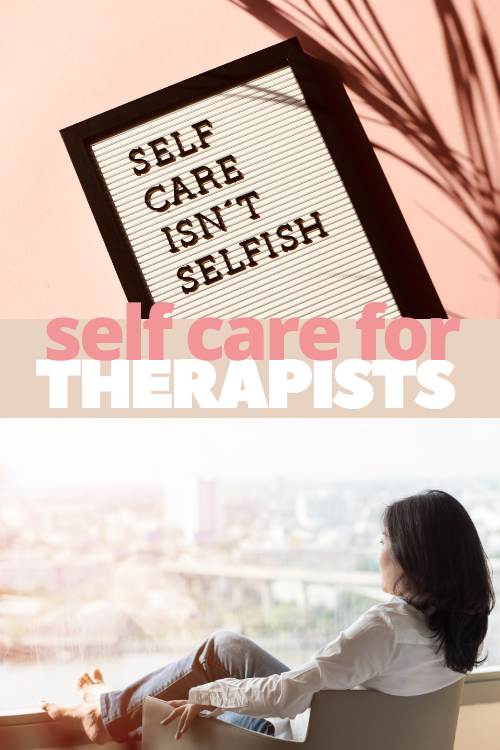
psychological self care
An important component of all of the self-care strategies listed in this post is the psychological self care aspect.
By the term “psychological self care” we are referring to the specific actions and practices that we as therapy providers can engage in as a tool to support our mental and emotional well-being.
This means that we, as OT professionals, take care of our psychological needs, knowing that stressors impact our ability to manage stress, engage with others with empathy, and function in day to day tasks. When we have the appropriate tools to support mental health, we can be proactive and intentional about setting boundaries.
Not only is the emotional aspect of self-care a form of self-awareness and self-compassion, but it builds resilience in ourselves. Having coping mechanisms, stress relievers (like taking a minute to do relaxation breathing even during a busy day) supports social, emotional, and mental health needs.
All of these tools are strategies we have in our therapy toolbox as professionals, but sometimes, pulling out the correct resources for ourselves is more difficult than supporting our clients.
Taking care of our psychological needs is an important part of therapy self-care and promotes mental health.
Affiliate links are included in this post, but I only recommend products that I own, and love!

Colleen Beck, OTR/L has been an occupational therapist since 2000, working in school-based, hand therapy, outpatient peds, EI, and SNF. Colleen created The OT Toolbox to inspire therapists, teachers, and parents with easy and fun tools to help children thrive. Read her story about going from an OT making $3/hour (after paying for kids’ childcare) to a full-time OT resource creator for millions of readers. Want to collaborate? Send an email to contact@theottoolbox.com.



